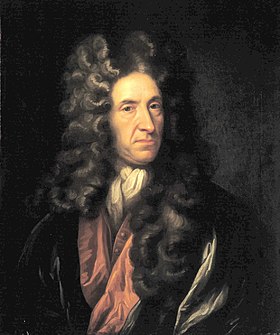Daniel Defoe
| Daniel Defoe | |
|---|---|

Daniel Defoe
|
|
| Born | Daniel Foe 1659–1660 London, England |
| Died | 24 April 1731 (aged 70–72) London, England |
| Occupation | Writer, journalist, merchant |
| Genre | Adventure |
Daniel Defoe (/ˌdænjəl dᵻˈfoʊ/; c. 1660 – 24 April 1731), born Daniel Foe, was an English trader, writer, journalist, pamphleteer, and spy, most famous for his novel Robinson Crusoe. Defoe is noted for being one of the earliest proponents of the novel, as he helped to popularise the form in Britain with others such as Samuel Richardson, and is among the founders of the English novel. He was a prolific and versatile writer, producing more than five hundred books, pamphlets, and journals on various topics, including politics, crime, religion, marriage, psychology, and the supernatural. He was also a pioneer of economic journalism.
Daniel Foe (his original name) was probably born in Fore Street in the parish of St. Giles Cripplegate, London. Defoe later added the aristocratic-sounding "De" to his name, and on occasion claimed descent from the family of De Beau Faux. His birthdate and birthplace are uncertain, and sources offer dates from 1659–1662, with 1660 considered the most likely. His father James Foe was a prosperous tallow chandler and a member of the Worshipful Company of Butchers. In Defoe's early life, he experienced some of the most unusual occurrences in English history: in 1665, 70,000 were killed by the Great Plague of London, and next year, the Great Fire of London left standing only Defoe's and two other houses in his neighbourhood. In 1667, when he was probably about seven, a Dutch fleet sailed up the Medway via the River Thames and attacked the town of Chatham in the raid on the Medway. His mother Annie had died by the time he was about ten.
...
Wikipedia
